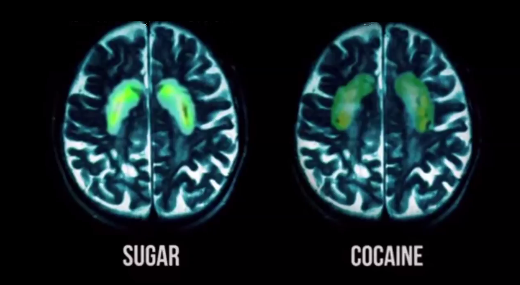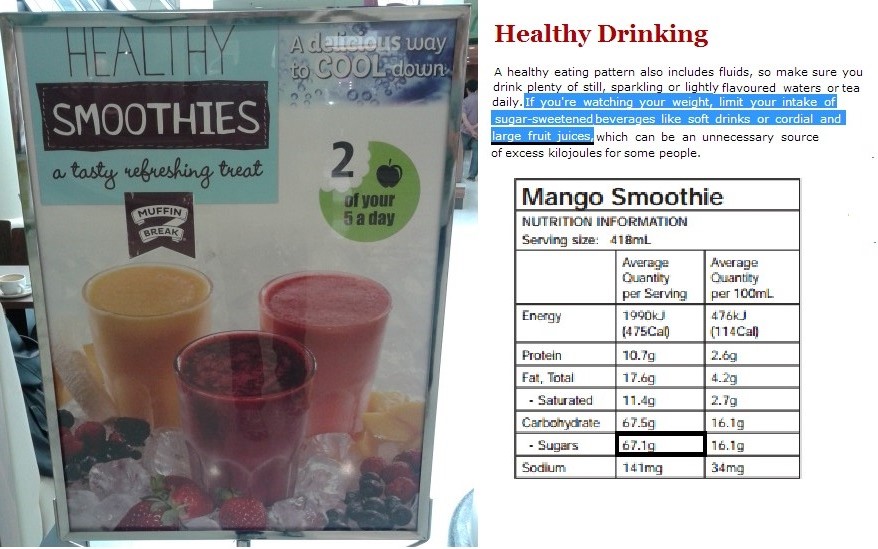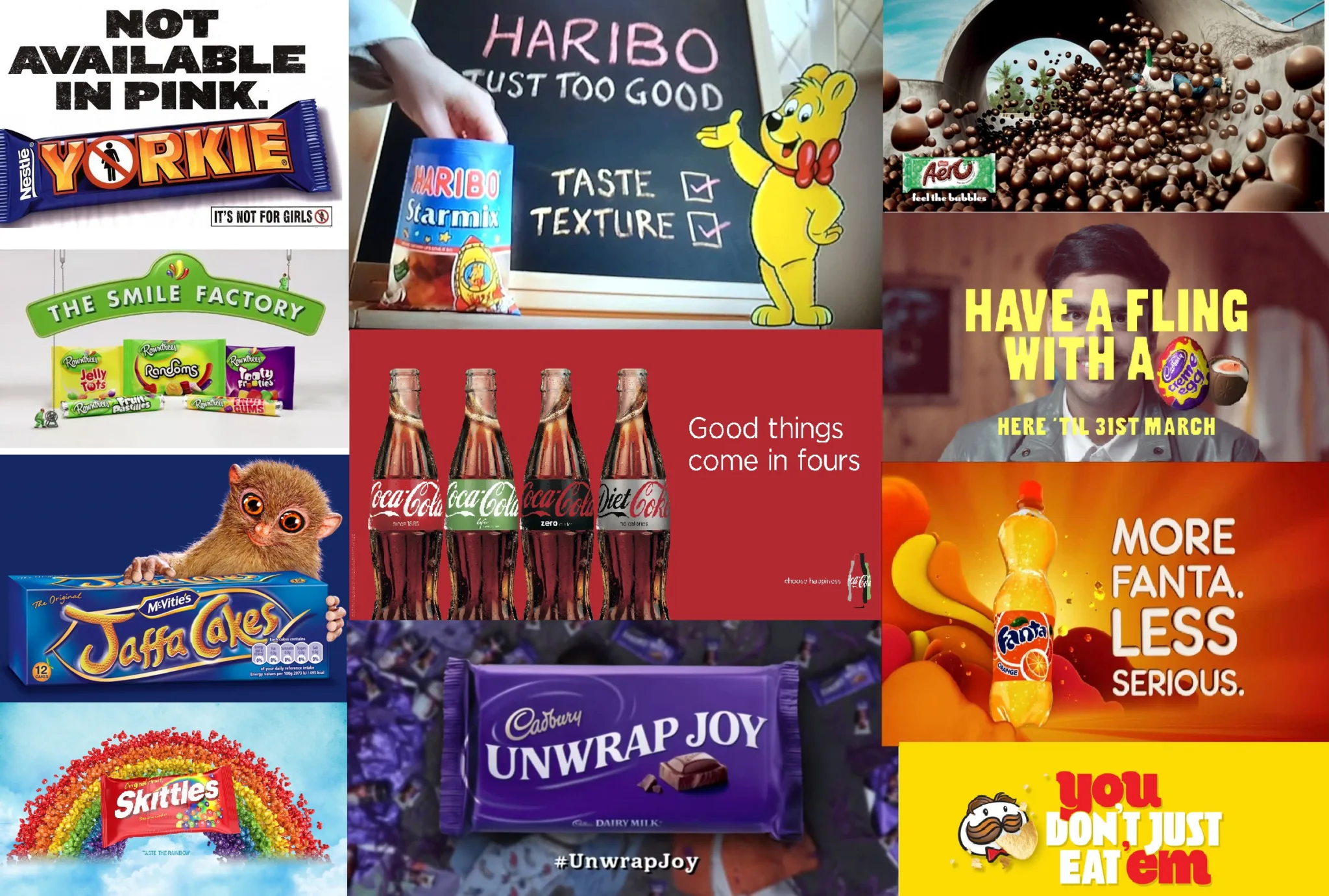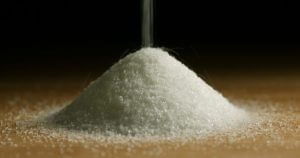In this article I’ll tell you how to give up sugar by outlining seven key steps you can take right now.
Obesity is one of the leading causes of preventable death, second only to smoking.
2 in 3 adults are overweight and 1/3 of those are classified as obese. Taking on excess calories in the form of sugar is a main contributor to this unhealthy trend.
The first thing you need to know about sugar is that it is addictive. Not “moreish”, not just “tasty”, but addictive.
How addictive is sugar? With the use of brain scans some doctors concluded that sugar is as much as 8 times more addictive than cocaine. [1]*
*Some people argue that it’s the combination of sugar and fat that’s addictive. For the purposes of giving up sugar it helps to take it as seriously as an addiction, whatever the semantics. For more information I recommend reading Salt, Sugar, Fat.

Once you start realising the size of the task ahead of you, you’ll appreciate that not everyone can just give up sugar without any effort.
How To Give Up Sugar: The Steps
These steps serve only as a guideline, and you will have to exercise considerable willpower and self control in order to fully “kick the habit”.
By recognising and treating sugar consumption as an addiction, we can approach quitting in the same way as a smoker would to giving up cigarettes, or an alcoholic going tee-total.
Step One – Identify All Your Sugars
One of the most important things you can do to avoid sugar is to understand how much of it is in the foods you eat.
Beyond the obvious sources like fizzy drinks, sweets, chocolate and cake, you should also be aware of “hidden” sugars like those in fruit juices, yoghurts and breakfast cereals.
Make an effort to read the labels of all the foods you eat often and check the sugar content per serving.
Tip: If your food doesn’t have a label you can write “_____ nutritional info” e.g. banana nutritional info, into a search engine and it often provides you with a breakdown of sugar content.

Step Two – Get Sugar Out Your House
Now you know what to avoid, the biggest action you can take is to make sure there is none of it in your house.
Don’t pledge to start being good once you’ve eaten what’s left in the cupboards. The best way to quit is to stop eating those foods altogether, which starts today. Give it away or throw it away.
If someone else has junk food in the house, tell them to hide it or lock it away. Better yet, convince them to join you and commit to this health lifestyle change.
If you have easy access to sweets then I guarantee there will be some time in the next week or month that you get a craving. Maybe you’ve had a bad day or you can’t be bothered to cook, and it takes two seconds to open a sweet and eat it.
Save yourself exercising willpower all day long by removing the source of temptation.
Step Three – Plan Your New Meals
Once your sugary foods are out the house, you will need to decide what to eat instead.
I suggest plenty of fresh vegetables, whole grains, sweet potatoes, chicken, fish, nuts, eggs. Eat real food. As a general rule: be wary of any food that has its own advert on TV.

When you’re shopping, write down what it is you need to buy. Think in terms of meals and food combinations rather than individual items.
If you’re going out for the day, make sure you’re aware of the food options, and if in doubt bring a healthy snack with you.
Step Four – No Cheating!
The term “Cheat Meal” or “Cheat Day” is commonplace among diets in the last few years. The idea is that as a reward for sticking rigidly to your healthy eating, you allow yourself an unhealthy option scheduled in every week as a reward.
Here’s why this is a huge problem for some.
There are two kinds of people: those who can eat one cookie and stop, and those who go back for more.
If you’re someone who goes back for more, then cheat meals are not a good idea. If you have sugary junk food once a week, then once a week you’ll be reminding your brain what it is you want it to give up and once a week you’re back to square one.
Another problem with having these special “treat” days is that you start thinking of this bad food as a reward . Answer me this: since when have obesity and diabetes been a reward for someone?
If we go back to the idea you should treat sugar as an addiction. Can you imagine an alcoholic with a vodka bottle in the house, “rewarding” themselves every week with a few shots if they’ve behaved. It sounds ridiculous in that context but that’s exactly what you’re doing with sugar.

Step Five – Know Your Enemy
How has our society managed to get to the point where we view unhealthy food as a reward? I’ll tell you.
The food industry. The food industry use advertising to make you think sugar is some sort of reward for yourself.
It’s not enough that it features prominently at Easter, Halloween and Christmas, and it’s the easy go-to gift for birthdays. Enter most shops and the front counter is littered with chocolate. Why? Because to them it’s easy money from impulse buying since they know you’re hooked on the white stuff.

What the Marketing does is try to implant ideas in your head that their food is desirable, so pay attention next time you see junk food advertised. Everyone’s skinny, everyone’s happy, words like indulgent, creamy and smooth are thrown around. The adverts are full of actresses, normally skinny ones, ‘treating’ themselves to chocolate or ice cream because they deserve it.
Yes sugar sets off the pleasure sensors in your brain, but that’s where the benefits stop. You get a brief sensation when you’re eating, normally followed by disgust at yourself for giving in to temptation and regret that you ate it.
When you’re next hungry, instead of listening to your immediate cravings, have a think about how you’ll feel about this decision later in the day, and consider what you’ll want to have eaten for that meal. Don’t think about what you want right now, because your decision-making is clouded by addiction.
Remember: Addiction is the goal for these products. The only thing these companies care about is profit. They do not care about your health or your well being.
Step Six- Know Your Weaknesses
Did you know you are more likely to eat junk food when you are Hungry, Angry Lonely or Tired?
Remember the acronym H.A.L.T. Once you feel a sugar craving, do a mental checklist. Am I Hungry? Yes. Eat something that’s good for you. If not, am I Angry, Lonely or Tired? If that’s a yes, you’re not hungry, you just want to change the way you feel.

Distract yourself with something else, have a glass of water or a healthy snack, just don’t give in. A great way to tell if you’re an emotional eater is if you have a craving for a specific food. If you notice yourself thinking “ohh I really want chocolate right now”, there’s your clue!
Pay particular attention to any recurring habits. Do you eat every time you’re bored? Every time you work late? Every time you have a fight with your significant other? If you have a bad habit then recognising that it’s happening is the first step to change.
Now, remember who your enemy is. Marketing. And they target your weaknesses. Hungry? Eat a snickers. Tired? McDonalds is open 24/7. Lonely? Cadbury’s have released a yoghurt called “Pots of Joy”.
They know exactly what they are doing, and that’s exploiting your health to make money.
You have to wake up and realise the food industry is not your friend!
Step Seven – Avoid Temptation
Sugar is everywhere. Don’t imagine for a second that once it’s out your house it’s out of your life. You’ll be offered it at friends houses, you’ll see it in restaurants, you’ll pass it in shops. Intense cravings will last 2 to 4 weeks before slowly fading, so every day is a battle.
By not putting yourself in a situation where you have to make a decision, you will increase your chances of success.
Be sensible. In the supermarket, don’t go down the junk food aisle. I’ll say it again. Do not. Go down. The junk food aisle. Can you imagine an alcoholic browsing the Beers, Wines and Spirits aisle expecting to get out the other end without seeing something they want? It’s not realistic for them, and it’s not realistic for you. So don’t do it.

Trying to give up sugar is a difficult thing to do. If you didn’t have the willpower to stop yourself getting to where you are now, then it’s going to take more than a token effort to get you back where you want to be.
So get all the junk food out the house, stay away from it in the shops and certainly don’t schedule it in as a cheat day. You need to start thinking of sugar as an addictive habit that you need to kick. And you need to start thinking of the marketing as an evil drug pusher getting you back on their product.
There will be intense cravings, there will be withdrawal symptoms, just like a drug. On average these last 2-4 weeks and then fade, just think of the health benefits once those cravings subside.
Remain strong every day and eventually you’ll have the strength to say no every time.
Thanks for reading this article. Please share this content and help those looking to give up sugar.

